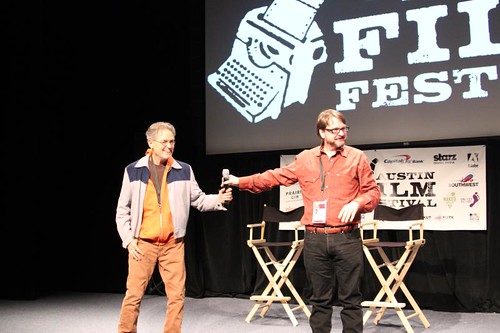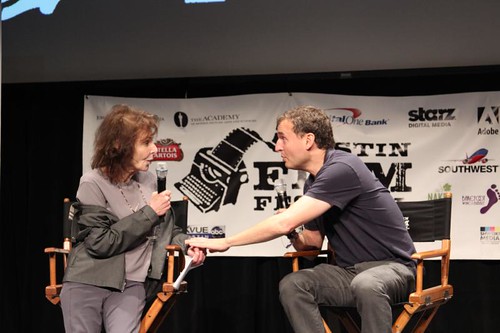Jette Kernion's blog
Review: Her
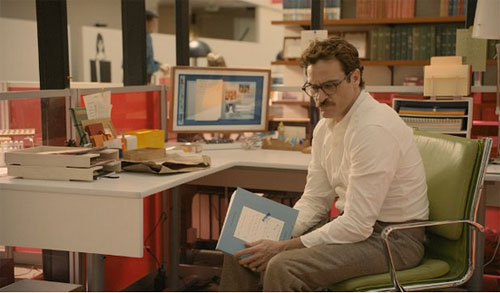
Filmmaker Spike Jonze doesn't make it easy in his latest film Her. He takes a fairly simple story, dresses it up in a realistically futuristic setting, and with the help of superb casting, creates a movie with such emotional impact that it feels like a kick in the head. More than once.
The film opens on an extreme close-up of Theo (Joaquin Phoenix), speaking directly into the camera, reading a love letter that sounds poignant and sweet. We come to realize that he's writing the letter on behalf of someone else -- he's a kind of professional Cyrano -- and that we've been watching him from the POV of a computer monitor, as though it were another person.
And that factors in heavily later, as lonesome Theo buys an operating system advertised as having artificial intelligence and the ability to learn. The OS assumes a female voice (Scarlett Johansson), and names herself Samantha. At first she is simply an efficient helper, but as she learns more about Theo and the world around him, she develops a personality as complex and emotionally rich as any human being. It follows naturally that Theo and Samantha build a strong attachment to one another.
Review: August: Osage County
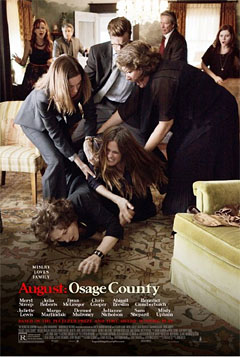 Of all the things to pop into my head while watching August: Osage County, quotes from a Noel Streatfeild "Shoes" novel would seem to be the very least likely.
Of all the things to pop into my head while watching August: Osage County, quotes from a Noel Streatfeild "Shoes" novel would seem to be the very least likely.
But there it was -- I kept recalling quotes from Theatre Shoes, related to a family of actors in the book. (Bear with me a minute as we digress into young-adult lit.) Sorrel is a 12-year-old girl who is learning to be an actress, and her Uncle Francis is a very grand and haughty actor-manager who "very consciously acted when he was acting and ... thought there must be something wrong with a performance which came naturally and easily."
In another series of quotes, Sorrel and her teacher discuss Uncle Francis's ambitious daughter Miranda taking a turn as Ariel in The Tempest, a role Sorrel also plays:
"Miranda's brilliant -- and yet, as Ariel you give the better performance, and that you'll find all the way through your stage career. It's getting inside the part that matters, and I think you've got inside the part as your uncle wanted it, and Miranda hasn't."
"But he said he would bet Miranda would be a great actress."
"So she will. Great like Edith Evans, perhaps ..."
Enough with the quoting, you say -- what does this have to do with an all-star adaptation of a Tracy Letts play (scripted by the playwright) led by Meryl Streep and Julia Roberts?
In August: Osage County, we watch Streep and Roberts give performances "with a pronounced personality and bursting with talent." (Sorry, these Streatfeild quotes are just too apt.) Streep in particular isn't acting; she's Acting. And while that can be impressive in its way, I found it tiresome, especially since few of the characters in this play are sympathetic or frankly, very interesting.
Streep plays Violet Weston, a rural Oklahoma woman fighting cancer who is short on tact and long on drug addiction. When her husband Beverly (Sam Shepard) disappears, she gathers her family around at the old family home for some extended tirades of verbal abuse and self-pity. The family includes her three daughters, portrayed by Roberts, Juliette Lewis and Julianne Nicholson.
Review: Inside Llewyn Davis
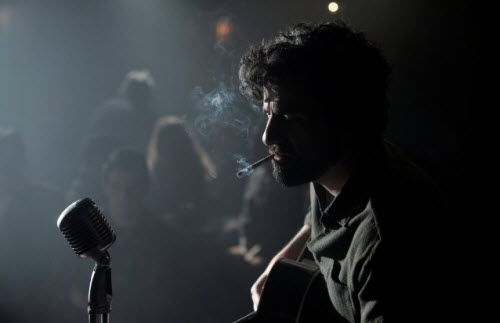
It's the cat. It ties the room together.
I'm talking about the cat in Inside Llewyn Davis. And by "room" I mean "movie." Without the cat, this film would feel structureless and almost entirely unlikeable. Its success as a plot device is a testament to the writing and directing powers of Joel and Ethan Coen.
The title character, played by Oscar Isaac, is a jerk and a moocher. He's knocked up his friend's wife (Carey Mulligan), he insults most of the people around him, he "does not suffer fools and likes to see fools suffer."* His longtime musical partner gone, he's trying to pursue a solo career and fumbles nearly every crucial decision, almost tragically. He would be wholly despicable were it not for two things, one of which is the way he treats that cat.
Llewyn feels responsible for the cat after it escapes from an apartment where he's staying, and that triggers the events in the movie. The storyline is not strong or obvious -- it's A Week In the Life of a Struggling Musician, and it sounds tedious on paper Llewyn sleeps on people's couches, sings for his supper, plays in a dingy nightclub with a folk-singing duo (Mulligan and Justin Timberlake), performs on a novelty record and even embarks on a road trip to Chicago, hoping to succeed with a major record producer/promoter. The typical overt narrative curve does not assert itself.
Holiday Favorites 2013: PJ Raval Enjoys a 'Smiley Face'
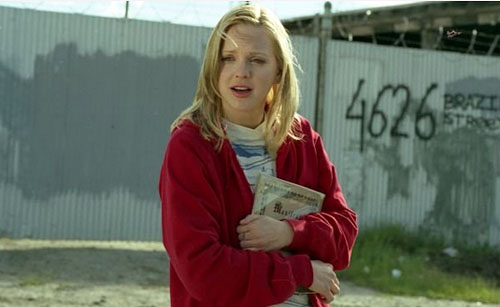
Welcome to Holiday Favorites, a series in which Slackerwood contributors and our friends talk about the movies we watch during the holiday season, holiday-related or otherwise.
Just as I thought we were entering an It's a Wonderful Life trend of holiday favorites this year, Austin cinematographer and filmmaker PJ Raval surprises me with a selection I couldn't have predicted. Raval's most recent film is the documentary Before You Know It (Don's review). He's worked as DP on Austin movies such as The Bounceback and Fourplay, and on the Academy Award-nominated documentary Trouble the Water, among many other films. And you might have seen one of the delightfully family-unfriendly music videos he's shot for local artist Christeene.
Raval's pick is a comedy I saw at SXSW 2007 and loved -- Smiley Face (my review) -- but never thought of as a holiday possibility. Until now. Here's what he has to say about the film:
One of my favorite winter holiday movies is Smiley Face by Gregg Araki. Now trust me, anyone who knows me personally will be shocked I'm listing a "stoner comedy" but I assure you, Smiley Face is an amazing piece of comedy filmmaking.
'Her' Tops AFCA 2013 Awards
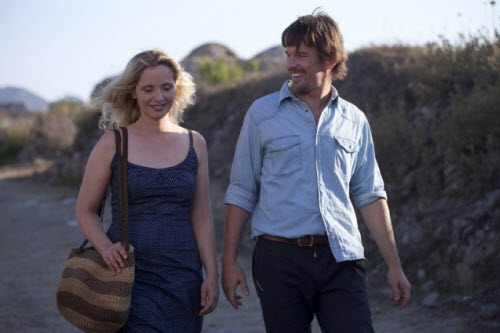
The Austin Film Critics Association (AFCA) not only awarded honors today to 2013 films like Her, 12 Years a Slave and Gravity, but also recognized several films with local and Texas ties.
Her, the latest film from Spike Jonze (which topped my own personal list of the year's best) won't be released in Austin until Jan. 10, but AFCA considered all films that had (or will have) a US release in 2013. Her also won Best Original Screenplay, by Jonze, and Best Score, by Arcade Fire. And AFCA created a special honorary award for Scarlett Johansson to recognize her voice work in the movie.
I've included the press release as well as the full list of awards and the group's Top Ten list below. A few notes about Austin and Lone Star connections:
- Best Austin Film went to Before Midnight (Elizabeth's review), from local filmmaker Richard Linklater. This is Linklater's fourth Best Austin Film award from AFCA.
- The Top Ten list includes Mud (Debbie's review) from Austin director Jeff Nichols at #7 and Before Midnight at #8.
Review: Go for Sisters
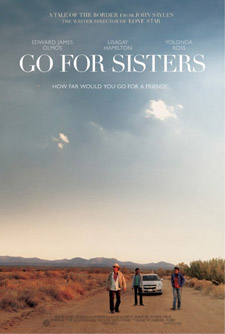
In his latest film Go for Sisters, which screened at SXSW and opens today in Austin, longtime indie filmmaker John Sayles (Lone Star, Matewan) brings us yet another almost noir-ish mystery set on the U.S.-Mexico border. But like his other films, it's primarily character driven. The characters in Go for Sisters are strong, complex and interesting, and make up for a story that seems to meander aimlessly at times.
Bernice (LisaGay Hamilton) is a parole officer who is inadvertently assigned to an old high-school friend, Fontayne (Yolonda Ross). Bernice was always the straight arrow, but Fontayne is on parole after serving time for drug-related crimes. But Bernice needs Fontayne's help to find her son Rodney, who has mysteriously vanished after one of his friends has been murdered.
Bernice and Fontayne soon realize they need help and engage the services of an aging, sight-impaired ex-detective, Suarez (Edward James Olmos) and end up on a long journey involving the border to find out what happened to Rodney and if he's even still alive.
Olmos could have stolen this movie quite handily, but Hamilton and Ross hold their own, especially in scenes where the two lead female characters are together. The changing relationship between Bernice and Fontayne is the centerpiece of the film, but is complemented by Olmos's charming performance. A scene at the border in which the trio poses as a musical group is one of the film's quiet gems.
The mystery plot should be in service of the characters, but it veers off into scenes that feel irrelevant. The scenes are often fun to watch, as when Hector Elizondo makes a brief appearance, but they cause the movie to drag slightly in the middle. One sequence involving the possibility of tunnels across the border felt like it could have been eliminated entirely, especially with the over-two-hour running time.
AFF 2013: All Our Coverage
Updated Nov. 18, 2013.
The Slackerwood team was all over Austin Film Festival this year. Here's our coverage, including guides, reviews, interviews and fest dispatches.
AFF 2013: Vintage Austin Double Feature
Austin Film Festival may be well behind us, but I am still thinking about some older Texas films at the fest that I stumbled upon almost accidentally. As I was planning my schedule for the Sunday of the fest on Saturday night, I noticed some oddly named films at the Rollins with descriptions that included "Texas independent film." I ended up skipping My Man Godfrey (which I can watch any time) to see what this screening was about.
All I knew about Invasion of the Aluminum People (1980) and Speed of Light (1981) were that apparently Jonathan Demme liked them, since he was going to "present" them. I assumed "presenting" meant he would do a nice intro, then scoot, as is typical at many such events.
The theater was about halfway full and I was one of the younger audience members. Later I would learn that many people in the audience had worked on one of the two films, or provided music, or been in a band with someone involved with the film. Both films employed a lot of musicians as their cast and crew. Well, it was Austin in 1980, I kind of assumed most of the people living here were musicians (or claimed to be). Austin filmmaker Richard Linklater sat a couple of rows in front of me, and I took that as a good omen -- this must be worthwhile.
AFF 2013 Dispatch: Elaine May and 'A New Leaf'
Once in awhile, you look at an Austin Film Festival panel listing and your heart just goes pitter-pat. Or thumpity-thump. Or whatever noise it is when you are especially excited about a panelist. I may be old and jaded but still susceptible. When I saw Elaine May would be in Austin for the fest, I decided I would go hear her speak no matter what time of day it was and what else I was supposed to be doing.
But last week was a little crazy for me, and I am never very organized with my fest scheduling, so it's not really surprising I got the date of Elaine May's panel wrong and missed it. (Dale Roe has a great write-up.) However, I did make it to Rollins on Friday to see A New Leaf for the first time and enjoy a Q&A from star/writer/director May.
This 1971 film is May's directorial debut -- she also co-stars in it with Walter Matthau. He's brilliant, she's brilliant, it's terribly funny, and I just found out it's on Amazon Prime streaming so I can watch it again soon. Preferably with my husband, who might find some sympathy with a character who's involved with someone terribly flaky who can't put her clothes on properly and has crumbs all over her front after eating and falls down and spills things a lot.
Review: Wadjda

I'm guessing many women reading this review can remember learning to ride a bicycle -- getting the training wheels off, or refusing to have them in the first place, perhaps having someone hold the back of the seat and run behind you ... and that glorious moment when you achieve solo cycling.
In the movie Wadjda, the title character is a girl who wants to own and ride a bike in a society where such an activity is considered inappropriate for females. An event most of us take for granted becomes subversive, and the simple story of the film takes on many layers. It's remarkably fascinating, primarily due to its contemporary Saudi Arabia setting.
The basic premise of the story -- Wadjda (Waad Mohammed) wants the bicycle for sale at the nearby toy store, and will do anything she can to earn the money for it -- is enhanced by the other women in the ten-year-old character's life. Filmmaker Haifaa Al-Mansour has taken a situation that many of us can identify with, and uses it to show us the shape of women's lives in Saudi Arabia. Wadjda's mother (Reem Abdullah) is consumed with fear that her husband will leave them and marry a woman who can give him a son. The schoolmistress at Wadjda's school, Ms. Hussa (Ahd), is continually finding fault with the girl who simply will not take pains to be appropriately ladylike.


